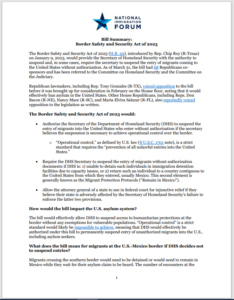 The Border Safety and Security Act of 2023 (H.R. 29), introduced by Rep. Chip Roy (R-Texas) on January 9, 2023, would provide the Secretary of Homeland Security with the authority to suspend and, in some cases, require the secretary to suspend the entry of migrants coming to the United States without authorization. As of March 31, the bill had 68 Republicans co-sponsors and has been referred to the Committee on Homeland Security and the Committee on the Judiciary.
The Border Safety and Security Act of 2023 (H.R. 29), introduced by Rep. Chip Roy (R-Texas) on January 9, 2023, would provide the Secretary of Homeland Security with the authority to suspend and, in some cases, require the secretary to suspend the entry of migrants coming to the United States without authorization. As of March 31, the bill had 68 Republicans co-sponsors and has been referred to the Committee on Homeland Security and the Committee on the Judiciary.
Republican lawmakers, including Rep. Tony Gonzales (R-TX), voiced opposition to the bill before it was brought up for consideration in February on the House floor, noting that it would effectively ban asylum in the United States. Other House Republicans, including Reps. Don Bacon (R-NE), Nancy Mace (R-SC), and Maria Elvira Salazar (R-FL), also reportedly voiced opposition to the legislation as written.
The Border Safety and Security Act of 2023 would:
- Authorize the Secretary of the Department of Homeland Security (DHS) to suspend the entry of migrants into the United States who enter without authorization if the secretary believes the suspension is necessary to achieve operational control over the border.
- “Operational control,” as defined by U.S. law (8 U.S.C. 1701 note), is a strict standard that requires the “prevention of all unlawful entries into the United States.”
- Require the DHS Secretary to suspend the entry of migrants without authorization documents if DHS is: 1) unable to detain such individuals in immigration detention facilities due to capacity issues, or 2) return such an individual to a country contiguous to the United States from which they entered, usually Mexico. This second element is generally known as the Migrant Protection Protocols (“Remain in Mexico”).
- Allow the attorney general of a state to sue in federal court for injunctive relief if they believe their state is adversely affected by the Secretary of Homeland Security’s failure to enforce the latter two provisions.
How would the bill impact the U.S. asylum system?
The bill would effectively allow DHS to suspend access to humanitarian protections at the border without any exemptions for vulnerable populations. “Operational control” is a strict standard would likely be impossible to achieve, meaning that DHS would effectively be authorized under this bill to permanently suspend entry of unauthorized migrants into the U.S., including asylum seekers.
What does the bill mean for migrants at the U.S.-Mexico border if DHS decides not to suspend entries?
Migrants crossing the southern border would need to be detained or would need to remain in Mexico while they wait for their asylum claim to be heard. The number of encounters at the U.S.-Mexico border reached over 2.76 million apprehensions in fiscal year (FY) 2022, the highest number in at least two decades. This increase in apprehensions was in part a result of asylum seekers fleeing Cuba, Venezuela, and Nicaragua. The asylum system is currently heavily backlogged, with some cases taking as long as five or six years to resolve. Under this bill, migrants would be in detention or must remain in Mexico while their case slowly proceeds through U.S. immigration courts.
The bill would particularly affect families with children and unaccompanied children, since both groups are usually allowed to remain in the U.S. while they pursue asylum protections. Because children cannot be detained by U.S. Immigration and Customs Enforcement (ICE), they would likely be required to remain in Mexico and potentially be exposed to human trafficking, violence, and/or other harm.
If immigration authorities are unable to hold migrants in detention or have them remain in Mexico and other contiguous countries, DHS would be required to suspend the entry of unauthorized migrants into the U.S., including asylum seekers.
The National Immigration Forum would like to thank Leighton Fernando G. Cook, policy intern, for his extensive contributions to this bill summary.


